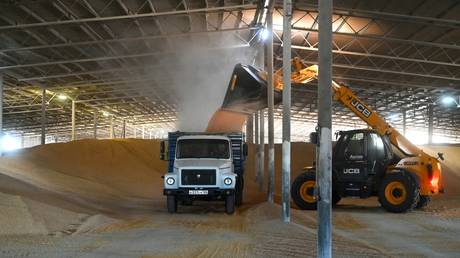
Russia considering grain export ban – Izvestia
The measure is aimed at protecting the domestic market
The Russian government has instructed the Ministry of Agriculture to start monitoring the level of the nation’s grain reserves on a monthly basis, Izvestia reported on Tuesday, citing relevant documents. The authorities may introduce an export ban if stocks fall to critical levels.
According to the report, a volume of 10 million tons of grain is considered by the ministry to be “critically low” – enough to last for about 1.5 months, given Russia’s annual consumption of 80-85 million tons of grain.
The ministry told Izvestia that the country’s current grain reserves are sufficient to ensure food security, considering the large stocks from the previous year and the bumper crop of 2023.
The minister of agriculture, Dmitry Patrushev, said at a meeting on Tuesday that Russia’s grain harvest in 2023 is estimated to be the second largest in the country’s history.
“Over 151 million tons of grain in bunker weight have been threshed, including almost 99 million tons of wheat,” Patrushev stated, adding that there is also a significant increase in the production of socially important crops such as rice and buckwheat.
According to the minister, this will allow Russia to completely cover its domestic needs and supply record volumes of grain to its foreign partners.
READ MORE: Russia delivers 25,000 tons of free wheat to Somalia
In March 2022, Russia temporarily banned grain exports to the countries of the Eurasian Economic Union to protect the domestic food market amid mounting pressure from Ukraine-related sanctions on the country’s economy.
For more stories on economy & finance visit RT’s business section


